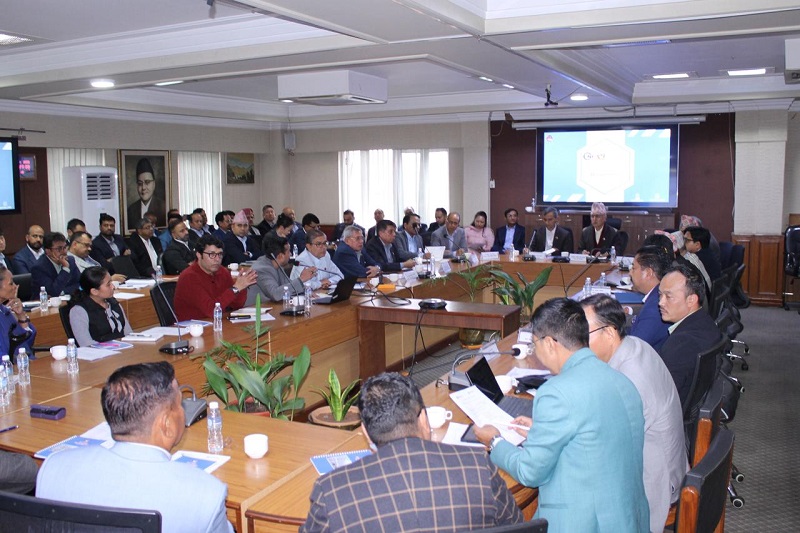Public-Private Dialogue Charts Path for Nepal’s Economic Recovery Post-Gen Z Movement
2nd November 2025, Kathmandu
In a crucial demonstration of collaboration, the Investment Board of Nepal (IBN) and the Federation of Nepalese Chambers of Commerce and Industry (FNCCI) jointly hosted a high-level public–private sector dialogue in Kathmandu on November 1 (15 Kartik 2082).
Economic Recovery Post-Gen Z Movement
The meeting was convened with a single, urgent focus: to address the profound impact of the recent nationwide Gen Z movement on private sector assets, assess investor experiences in the climate of instability, and outline immediate and long-term steps necessary to secure the future of Nepal’s economic recovery. This high-stakes dialogue featured top government officials, including the Finance Minister Rameshwar Khanal, Home Minister Om Prakash Aryal, Industry and Commerce Minister Anil Sinha, and Nepal Rastra Bank Governor Prof. Dr. Bishwanath Paudel, signaling the government’s serious commitment to addressing the private sector’s deep-seated anxieties.
Government Assurances on Security and Policy Reform
The core message delivered by the government’s delegation was one of commitment to stability, security, and procedural simplification, aimed directly at restoring shaken investor confidence. The recent violent protests led to severe damage to private properties, estimated by the private sector to be in the tens of billions of rupees, creating a climate of fear and insecurity that threatened to derail investment plans.
Finance Minister Rameshwar Khanal led the assurance, emphasizing the government’s firm commitment to policy reforms. He urged both domestic and foreign investors to not worry about investment security, indicating that the administration is prioritizing the creation of a stable, predictable legal and fiscal environment. The Finance Minister’s technical background and reputation for reform provide a critical anchor for this pledge.
Complementing this, Home Minister Om Prakash Aryal provided a direct security guarantee, assuring the private sector that the Ministry of Home Affairs takes private-sector security concerns seriously. He acknowledged that good governance is a shared responsibility, implying that security and transparent administration go hand-in-hand in fostering a trust-based business environment.
Further accelerating the reform agenda, Industry and Commerce Minister Anil Sinha highlighted that procedural reforms are prioritized. Crucially, the Minister committed to accelerating work to clear pending matters without waiting for lengthy legal changes, indicating a pragmatic approach to immediately address bureaucratic bottlenecks that frustrate investors. This commitment to ‘doing’ rather than just ‘legislating’ is a powerful signal of intent.
Mobilizing Investment and Addressing Business Challenges
The private sector, represented by the FNCCI, and the central bank laid out the challenges and opportunities for capitalizing on existing resources to drive infrastructure and production.
The Private Sector’s Urgent Demands
FNCCI President Virendra Raj Pandey gave a sobering account of the difficulties faced by businesses, highlighting the severe incidents of asset damage, looting, and arson that occurred during the recent unrest. This trauma to the private sector necessitates a strong, visible response from the state. President Pandey underscored two major requirements:
Government Support: A call for government support to encourage private-sector resilience and investments, which may include incentives, tax relief, or concessional loan mechanisms to assist affected businesses.
Digitalization for Transparency: An urgent demand for the digitalization of public services to ensure transparency and significantly reduce corruption. Digitization makes public services ‘faceless’ and ‘paperless’, which reduces opportunities for rent-seeking and improves the overall ease of doing business—a vital step for good governance.
Capital Availability and Infrastructure Focus
From the financial sector, Nepal Rastra Bank Governor Prof. Dr. Bishwanath Paudel provided an essential reassurance regarding liquidity. Governor Paudel noted that sufficient investable funds exist in banks and financial institutions. He strongly encouraged investment in infrastructure projects, a sector that offers high returns and has a multiplier effect on the overall economy, suggesting that capital availability is not the primary constraint to recovery. The central bank’s indication of liquidity underscores that the hurdle to new investment is largely related to confidence and the perceived risk environment.
Streamlining the Investment Process
A key institutional response to the procedural and bureaucratic challenges was presented by the IBN, which is tasked with attracting and facilitating large-scale investments in Nepal.
Investment Board CEO Sushil Gyawali outlined concrete plans to enhance the investor experience through practical reforms. He committed to implementing a single-window service system for investors, which will enable direct project registration and streamlined approval processes. This single-window mechanism aims to drastically cut down on time and cost for investors by coordinating multiple government agencies under one roof. CEO Gyawali also reviewed recent legal and institutional reforms under the Public–Private Partnership framework and reiterated the board’s commitment to fostering a truly conducive business environment.
The overarching conclusion of the high-powered dialogue was a shared recognition that recovery and sustained economic growth are not possible without robust collaboration between the public and private sectors. By addressing the immediate security concerns, pushing forward policy and procedural reforms, and encouraging the strategic deployment of available capital into job-creating projects, both sectors aim to effectively turn current challenges into opportunities and cement investor confidence in Nepal’s future economic trajectory.
For More: Economic Recovery Post-Gen Z Movement







